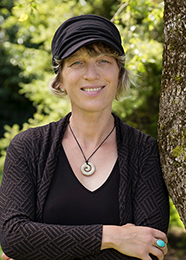MSc, PhD(Otago)
Senior Lecturer
 Room 4.19, Otago Business School
Room 4.19, Otago Business School
Tel +64 3 479 8167
Mob +64 21 181 2204
Email wiebke.finkler@otago.ac.nz
- Research Lead, Visual Research & Creative Marketing Lab, Department of Marketing
- Associate Editor of the Journal of Ecotourism
- Divisional Teaching and Learning Committee
- Chair, Departmental Teaching and Learning Team, Department of Marketing
- Board Member of Alzheimer's Otago
- Board Member of Interpretation Network New Zealand
With a background in both natural and social sciences, and 18 years of industry experience in filmmaking (www.wiebkefinkler.com) my research interests focus on the power of creative communication for behaviour change, and how video, when combined with community based social marketing approaches can be used as a tool for sustainable management, conservation and social impact.
I have worked on a wide range of communication projects covering science, environmental, health and cross-cultural communication, and have a strong interest in developing visual storytelling and visual research as part of academic research methodologies and teaching innovation.
My research on sustainable tourism management focused on responsible whale watching (and other wildlife tourism encounters) using a quantitative-qualitative research approach to evaluate the role of marketing-based science communication for sustainable tourism marketing.
I also run hands-on creative communication workshops for academics, educators, students and non-academic audiences, and teach pocket filmmaking, including camera techniques, video editing, social media and storytelling.
Research interests
I established the Visual Research Lab focused on creative marketing for positive change. Three particular research themes are part of the Visual Research Lab: (1) visual campaigns (video/images and copywriting) for positive social, sustainability and conservation change, (2) storytelling using 360 video and ambisonic sound, and (3) science marketing.
Feel free to contact me about other related cross disciplinary research including the creative arts, behavioural change and visual communication.
- Filmmaking and Storytelling
- Marketing for positive change
- Science Marketing
- Community Based Social Marketing
- Visual Research and Creative Strategies
- Online teaching and student immersion
- Responsible Marketing
- Immersive 360 VR
Current research
- Climate change communication on social media. Funded by Spanish Ministry of Science this project focuses on how to best communicate climate change through social media, with a particular focus on the role of storytelling, images and emotions.
- The Power of Visual Media, User Generated Content and Cultural Storytelling for Online Teaching (UORG Project 1)
- 360° Videos for Immersive Teaching Online and in the Classroom for Secondary and Tertiary Education: the new frontier (UORG Project 2)
- Centres for Asia Pacific Excellence (CAPEs) Project. Development of Culture Ready tourism training programme. Developing and evaluating a video-based online training programme focused on cross-cultural communication in collaboration with industry stakeholders.
Teaching responsibilities
- MART 333 Creative Marketing Communication
- MART 449 Creative Marketing for Behaviour Change, Sustainability and Social Good – distance paper
- MART 469 Advertising Planning and Concept Development
Student supervision
- Holly Kerehi Bates Williams, PhD, How can literary and visual media be used to alter public attitudes and behaviour toward New Zealand's native birds?
- Carissa Turner, PhD, From Caring to Action: What does it take to spark behavioural change in support of conservation?
- Yang Yu, PhD, Making a Solitary Big Cat Social: Evaluating the Use of Social Media to Promote Snow Leopard Conservation in China
- Maddison Smith, Master's, Investigating the effectiveness of Action Spurs in storytelling for evoking efficacy and agency to adopt pro-environmental behaviours
- Lily Bryden, Master's, Fostering Dementia Friendly Communities: A Business Perspective
Office hours
Mondays 1:00pm-2:00pm
Publications
Davis, L. S., Finkler, W., Lo, W. H., Rabbidge, M., Zhu, L., & Zollmann, S. (2024). 360 storytelling for immersive teaching online and in the classroom for secondary and tertiary education. Proceedings of the IEEE Ccnference on Virtual Reality and 3D User Interfaces Abstracts and Workshops (VRW). (pp. 935-936). IEEE. doi: 10.1109/VRW62533.2024.00264 Conference Contribution - Published proceedings: Abstract
Finkler, W., Davis, L. S., Ruwhiu, D., Li, L., Lloyd, N., Beatson, N., & Zhu, L. (2024). Science stories through a cultural lens: The effects of cultural framing of storytelling in the natural and social sciences. Metode Science Studies Journal, 14, 159-165. doi: 10.7203/metode.14.26592 Journal - Research Article
Zhang, L., McNeill, L., & Finkler, W. (2023). Students' perspective of e-learning in higher education. In M. Thyne & S. Biggemann (Eds.), Proceedings of the Australian & New Zealand Marketing Academy Conference (ANZMAC): Marketing for Good. (pp. 383-385). [Full Paper] Conference Contribution - Published proceedings: Full paper
Finkler, W., Smith, M., & Aitken, R. (2023). Action-based storytelling: A climate change proof-of-concept. In M. Thyne & S. Biggemann (Eds.), Proceedings of the Australian & New Zealand Marketing Academy Conference (ANZMAC): Marketing for Good. (pp. 211). [Abstract] Conference Contribution - Published proceedings: Abstract
Haid, M., Albrecht, J. N., & Finkler, W. (2023). Barriers to the implementation of sustainability in tourism destinations: Evidence from Tyrol, Austria, and the South Island of New Zealand. International Journal of Tourism Policy, 13(6). doi: 10.1504/IJTP.2023.134513 Journal - Research Article